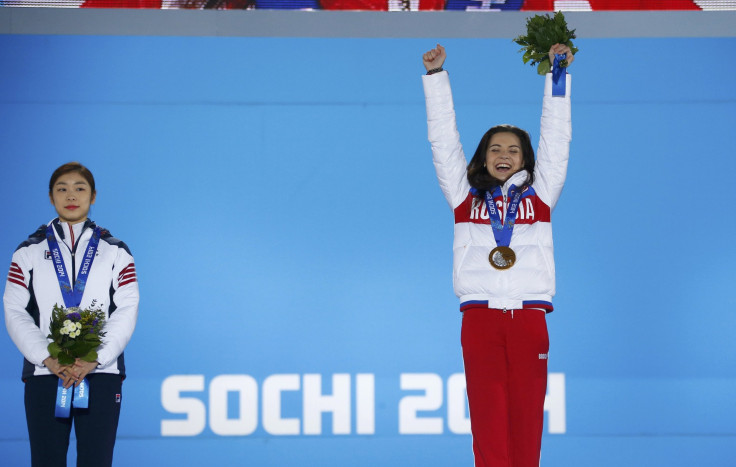Yuna Kim Robbed: How Figure Skating’s Scoring System, Judging Denied The South Korean A Gold Medal

The controversy surrounding the figure skating results at the 2014 Winter Olympics in Sochi, Russia, is still fresh in many viewers’ minds, less than two weeks after the free skate. Russian teenager Adelina Sotnikova won the gold in an effort that many people believe was weaker than the performance from silver medalist Yuna Kim of South Korea.
When the scores were posted on the giant scoreboard at the Iceberg Skating Palace on Feb. 20, it was obvious that there was a divide between those in attendance. An outpouring of cheers from Russians could not drain out derisive whistles from the foreign contingent, who overwhelmingly believed that Kim was unjustly denied her second consecutive Olympic gold medal.
Sotnikova scored a 224.59, which edged Kim’s 219.11, and the results prompted widespread condemnation from viewers around the world. Even many arena spectators would exit Iceberg to dismay by how Kim seemed to have clearly earned the gold, only to have it given to the host-country’s best skater.
The 23-year-old skated to a beautiful and nearly flawless performance, while Sotnikova stumbled on her first jump, as her hands touched the ice. Kim appeared to be the more polished and refined skater, while Sotnikova gave a strong, but rather uneven technical performance.
But based on the scoring system in place, was Kim actually robbed?
In a phone interview with Scott Hamilton, a figure skating expert and 1984 gold medalist, the judges’ scoring was less controversial than it came off.
“The way the component scores are written, you’ve got a lot of wiggle room of saying that as beautiful as Yuna was, as gorgeous as her skating is, Adelina checked off all the little boxes for the component score. It gets down to whether it was equal to Yuna’s,” said Hamilton.
“Under the criteria, there’s a case for [Sotnikova winning] under the rules.
“But that being said, it’s a stretch,” he added, with a laugh.
Breaking down the free skate, Sotnikova did in fact perform more jumps, though she did not execute them as well as Kim.
“On the technical side, when I looked at Yuna’s element sheet and I saw that there were two double Axels and two triple Salchows,” said Hamilton, who believes that skating should never be reduced to numbers. “I was wondering what she was leaving out and it didn’t take me long to figure out that she could’ve done a loop, which would’ve helped her case, and she could have repeated one of the triples.
“That would’ve been more than enough points for her to defeat Adelina. Yuna felt at this point in her life, when she’s won all these competitions by 15 or 20 points, she can give up a few and she’d be fine. It’s just the way the night played out with having somewhat of a home-ice advantage to Adelina.”
Many would likely agree with Hamilton’s assessment that the event taking place in Russia played a role in the final score. Even fifth-place finisher Yulia Lipnitskaya, a 15-year-old from Russia who stumbled in the long program, seemed to have finished at least two places ahead of more worthy skaters.
Much of the discussion over home-ice advantage is nothing new in sports, let alone figure skating. Nearly every sport offers some type of favoritism for the home side from either judges or referees.
However, in the case of the 2014 Games’ figure skating finals, there is also the issue of how the judges were selected. There are nine judges in the long program, which are chosen from a pool of 13. In the short program, there were judges from the U.S., Great Britain, Sweden, and South Korea, but rules wouldn’t allow for those judges to be a part of the free skate the next night.
The free skate had a judge from the Ukraine, Yuri Balkov, who had been suspended from judging after fixing an event at the 1998 Winter Olympics in Nagano. Another judge, Alla Shekhovtseva, is married to the general director of the Russian figure skating federation.
It might be difficult to overlook the judges’ scores, which are anonymous, when factoring the result of the long program.
Hamilton believes conflicts of interest with judges is an issue the International Skating Union (ISU) needs to address, but none of the current cries to change the scores in Sochi will occur, despite two million petitions on change.org.
“You can look at any judge on any panel and they probably have some sort of personal relationship to someone on the ice, so that one probably isn’t going to hold much,” he said. “I think it will be in the ISU’s best interest to prevent that from happening in the future, that if certain judges have relationships with people in governing positions, than they should recuse.”
Hamilton affirms how most judging is very subjective, and therefore lends itself to debate.
“The results will always be looked at with a roll of the eyes. I think that’s been skating’s problem,” Hamilton said.
Judges have their own opinions on what makes a performance great, and they can justify them any way they want.
“They always look at the judging as being somewhat questionable, and it’s not. Ninety-nine percent of the time, it’s completely defensible. People don’t like this result, and I’m not crazy about it on many levels.”
Perhaps the biggest shame in the figure skating final is that this was Kim’s last performance, without a chance to leave the sport on top.
Kim announced her retirement from competitive skating in the post-competition press conference, and her last image on the ice is her exceptional performance not gaining its perceived rightful place on the podium.
© Copyright IBTimes 2024. All rights reserved.




















